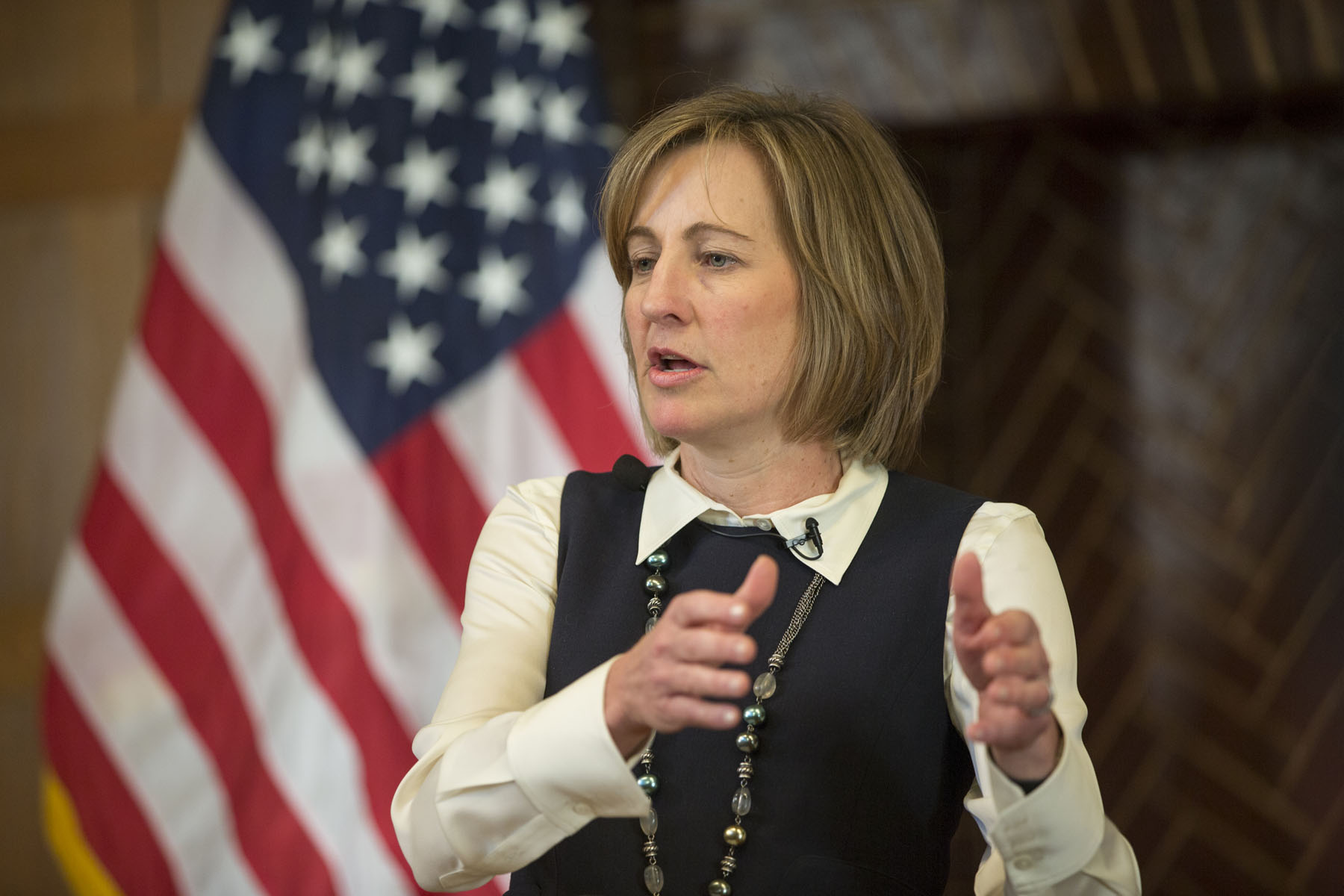The most important leadership lessons are pretty simple, former White House Press Secretary Dee Dee Myers explained Monday at the University of Virginia’s Frank Batten School of Leadership and Public Policy.
“Maybe the most important aspect of leadership is listening,” said Myers, who served as Bill Clinton’s press secretary during his 1992 election campaign and for the first two years of his presidency.
Myers recounted to an audience of about 120 Batten School students packed into Garrett Hall how former House Majority Leader Newt Gingrich, who led the push to impeach Clinton, had recently explained to her, in the green room of a political talk show, why he thought Clinton had better leadership skills than President Obama.
“Bill Clinton always, always, always listened,” Myers recalled Gingrich saying. “He was always listening for that little piece of common ground, that little agreement, where you could begin to make a deal. We didn’t agree on everything, but he always found something we could agree on. And that’s where we started a conversation.”
Listening has another major value, Myers noted. “People need to feel like they are heard in order to be part of the conversation and to feel invested in the solution. Even if you do not always agree with them, if people feel like you listened to them, you heard their perspective, they are much more likely to join you and support you, even if they’re not 100 percent behind you.”
Myers’ own life story demonstrated the value of another key leadership trait: perseverance.
After graduating from Santa Clara University in California, she went into the support side of politics. Her career started with a string of election losses. Her first job was with Walter Mondale’s 1984 presidential campaign, when Mondale lost 49 states in a landslide victory by Ronald Reagan.
Next she served as deputy press secretary for Los Angeles Mayor Tom Bradley on his losing California gubernatorial campaign, and then for Dianne Feinstein’s losing California gubernatorial campaign – “the only campaign she ever lost,” Myers said. After that, she worked for Michael Dukakis’ failed presidential bid.
The next presidential election cycle, she signed on as press secretary for an improbable presidential candidate from Arkansas. Only 6 percent of Americans recognized the name “Bill Clinton” when she joined his team.
That decision changed her life, leading to her position as the first female White House press secretary, and, at age 31, the second-youngest person ever to hold the position.
“It was an amazing opportunity,” she said. “It changed my life forever. I got to be part of historic moments I thought I would only read about.”
“At the Clinton White House, Dee Dee Myers was a pioneer,” professor of public policy Gerald Warburg said as he introduced Myers. “She broke up the good ol’ boys network in the White House press room. Because of the flak she took … and because of the extraordinary grace and strength with which she managed her job, doors are open for women in this room and across the country.”
After leaving the White House, Myers was a consultant for the critically acclaimed NBC drama, “The West Wing.” The show’s White House press secretary, C.J. Cregg (played by Allison Janney), was partially based on Myers.
Working on the show “was great because ... I got to take all this stuff that happened to me, and change the ending,” she said, drawing a round of laughter.
Myers is also the author of the 2008 New York Times best-selling book, “Why Women Should Rule The World,” and currently is managing director of public affairs at The Glover Park Group, a public relations consulting firm in Washington.
Myers commended the students on attending a school that explicitly strives to teach leadership, a growing trend at many colleges across the nation in her observation.
In a question-and-answer session following her remarks, one student asked what she could do to set herself apart in her career.
“You all will fail,” Myers said, advising the audience to read biographies of great leaders like Winston Churchill to see how many times he failed in his long career.
“Be willing to accept setback as part of success. It’s not the end of the story, but a chapter in the story, and keep moving on.”
Her own high risk tolerance enabled her to work on all those losing campaigns, until she found a break.
“What was the worst that could happen? I would have to move back in with my parents,” she quipped. And she did, several times, working retail jobs in the holiday season after a November loss.
“It’s really important to do something you love,” she advised. “Don’t wed yourself to a five-year plan. Life will throw you opportunities and curveballs. You need to learn to hit one and take advantage of the other.”
The Batten School Graduate Council organized the event.
Media Contact
Article Information
April 9, 2014
/content/former-white-house-press-secretary-shares-simple-leadership-lessons-uva

